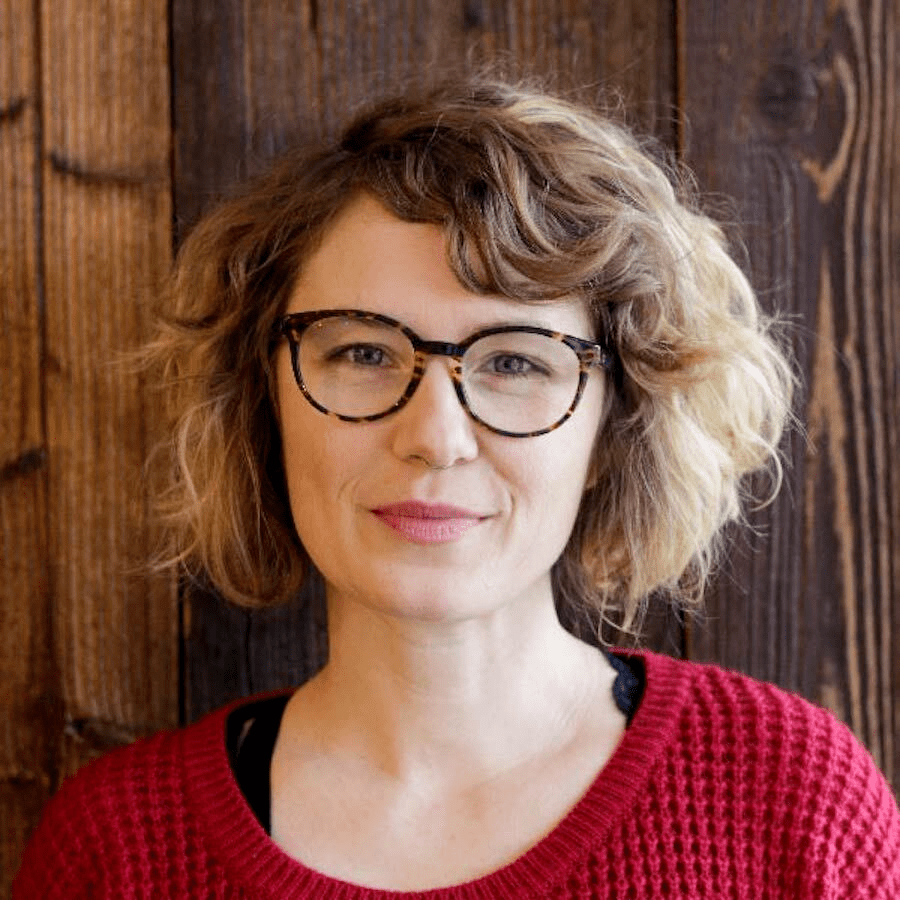Photo by Tania Herrera of Chella Quint holding a STAINS™ stain.
Meet #periodpositive comedian Chella Quint

Can jokes about periods be empowering? We caught up with zine-maker, teacher, and #periodpositive comedian Chella Quint, ahead of her new show at the Edinburgh Fringe. Quint, who lives in Sheffield, UK, had a few things to say about the comedy’s potential to challenge period taboos.
What does “period positive” comedy mean to you?
I coined the term “period positive” in 2006 to describe the show when it was mostly made up of zine readings and comedy sketches—it came from concepts like “sex positive” and “body positive.” I wanted to make sure people knew that you didn’t have to love your period, but you could learn to love to talk about it, and that putting positivity into the public discourse around periods would counteract the negative messages put out by a long history of menstrual product adverts. I also wanted to invite audiences of all genders to feel welcome. Cis guys and other folks who don’t have periods are curious, but many feel they should already know, or aren’t allowed to ask. My show gives people permission.
Period positive comedy in general punches up, not down. This is a common phrase used in comedy more broadly to describe its use as a tool for challenging those in power instead of picking on those who are not.
Jokes about periods used to mostly be made by people who don’t get periods ABOUT people who do, reinforcing messages of shame about periods from advertising, religion, cultural history… I did a TEDx Talk in 2012 where I explained that period positive comedy meant that we weren’t the butt of the joke—that those perpetuating taboos were.
I started the project with a zine called “Chart Your Cycle” in 2005, which encouraged people to do just that. I think one of the reasons I like Clue so much is because you guys are doing such a great job of sharing the message that charting your period is incredibly valuable. I went on from there to do a zine called “Adventures in Menstruating” and have been doing incarnations of that ever since. Mocking old ads, modern ads, sharing the news about menstrual activism from around the world, dispelling myths, teaching basic biology catch ups, and coming up with little adventures people can do themselves after the show’s over to keep it flowing.
A lot of adverts and the way periods were (and sometimes still are) taught about in school discourage us from “comparing notes.” When an audience is all together, it becomes clear that a lot of us have had the same experiences. Comparing notes is healthy, and, in the case of supporting people to brave an awkward chat and report worrying symptoms to their doctors, it can save lives.
Why did you choose to use comedy to discuss periods in public?
I’m a comedian, and I love to do comedy about topics to do with science, health, social justice and other political issues.
I think I’ve had particular success with it with periods and sex ed topics because I’m also a qualified drama and sex education teacher. I went back to university and then went on to freelance education advisory and comedy but I was teaching at the time. It’s why I can handle hecklers. Kids are a tough crowd and the stakes were really high! I was doing six shows a day! Using humour and interactivity to teach is incredibly effective, and it works on stage too. If you’re laughing you’re learning.
How can comedy be empowering?
When you’re laughing, you’re opening up to new ideas and you’re in a positive place. I call it a “good shock.” It gets audiences relating to me, to the material, to each other, and in the moment of that shared experience, it’s a really positive energy. People are up for reconsidering things they thought they knew. So when I offer ways to reclaim some of the public story of periods, and help people face some deeply held fears and beliefs, a big shift happens in a really short amount of time. It’s incredibly powerful to witness and to be a part of. Chatting to folks after the show is brilliant.
Comedy can really shift the power balance in people’s minds, and I see it happen all the time with audiences. We may be doing a silly dance, but that dance is designed to teach kids about reusable menstrual products, and think about the disposables industry in a new way. Also, dancing is fun!
Can you share one of your jokes with us?
I always start the show by asking the audience this riddle: What’s black and white and…RED ALL OVER? And then the audience goes “What, Chella?” and I sheepishly reply “An embarrassed penguin… What, you thought it would be about periods? Not EVERYTHING in the show is about periods, geez, you guys. …OK everything else in the show from now on is about periods.” The rest of the show is a lot of interaction and visual gags, and there is a song, and not forgetting the Menstrual Product Mambo, which you can learn at home!
What else do you get up to when you’re not doing stand up?
I research menstruation education and disseminate reports and resources through the campaign I founded, #periodpositive. I have been working with my city, Sheffield, to pilot the #periodpositive schools charter and find holistic ways to address period poverty through multi-agency working and education—for professionals working with young people, as well as the young people themselves.
I also do a lot of improv comedy. It’s one of my favourite things and I recommend more people give it a go, even just for fun, or go and support your local improv comedy troupes by watching their shows. If there isn’t one near you, start one up!
Find out more about Chella and #periodpositive online.